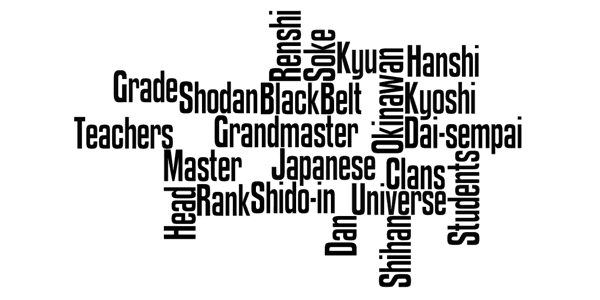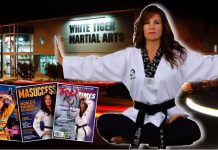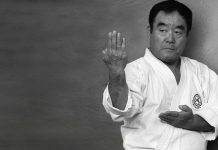Besides the potential harm expected from training with self proclaimed masters is that these individuals may be dangerous if their reality is challenged…
“Learn secret ninja fighting arts from Soke So and So!”
“Increase your striking power seven times with Master Such and Such ki development program!”
“Deadly street-effective grappling techniques as taught to the Green Berets by Grandmaster So and So!”
You’ve seen the advertisements on the internet or in the back of movie star martial arts magazines, usually with a bold picture of some guy in a colorful costume wreaking havoc on a very tough-looking assailant. Although the names in the above examples are fictitious, these type of advertisements often will include a list of fantastic, even unbelievable, teaching credentials or titles the “founder” of that particular martial arts style has accumulated.
You may have wondered what motivates these modern day snake oil salesmen to create such a parody of the classical martial arts. You might even have felt slightly embarrassed at the mockery created by these ludicrous advertisements and web sites.
Most serious martial arts practitioners scorn such gross assertions as the rantings of egotistical, money seeking impostors. Their fantastic claims are attributed to some desire to appeal to an adolescent audience with little or no martial arts experience. For the most part, the pretenders are viewed as relatively harmless individuals who only cast a shadow of shame on those who take a more serious approach to their study.
However, bizarre martial arts assertions may actually reflect a paranoid individual trying to cope with their innermost fears. Besides the potential harm that might be expected from training with an instructor who is one of these self proclaimed masters, with little or no real teaching experience, these disturbed individuals may also be quite dangerous to others, especially if their reality is challenged or they feel threatened.
The number of such “grandmasters” masquerading as martial arts instructors seems to be growing every year. This disturbing trend also reveals several other unique correlations. First, these masters often claim to be founders of what might be termed fabricated or synthetic martial art styles that are difficult if not impossible to authenticate. Second, an increasing number of these so-called experts advocate illegal responses to conflict, even murder, as appropriate actions to their students. Finally, there is definitely a gender bias, in that nearly all of them are male.
Let’s examine these subject areas more closely. At the very real risk of offending many serious and dedicated martial arts practitioners, the martial arts can be generally classified into one of three groups: classical, modern, and fabricated. To the uninitiated, these three groups seem to have much in common and it may even be difficult to distinguish any significant differences, but the underlying principles and philosophies are very dissimilar.
The first group, the classical martial arts includes those based on hereditary fighting styles that have remained virtually unchanged for hundreds of years. It has only been during the past few decades that any non-Japanese have even been allowed to study and practice the classical styles, if at all. Perfecting the techniques of a classical martial art often requires years of intensive training and instruction, usually directly from an instructor who inherited the right to teach the style from his predecessor.
Evolving from medieval Japanese warfare, classical martial arts were designed to provide warriors with the technical and mental preparation for using weapons in mortal combat. Essential for the battlefield or in personal conflict, the classical martial arts are intensely practical styles designed for an earlier era. In more recent years, though, many of classical styles have evolved to spiritual disciplines.
The second group, the modern forms are not strictly combat systems like their classical predecessors. Through rigorous mental and physical training, the ultimate goal of both physically and mentally, modern form proponents believe their particular style improves coordination and physical conditioning, while also benefiting the practitioners on an intellectual or even spiritual level. While modern martial arts like judo, karate, aikido, kendo, and kyudo may be based on much older classical fighting styles, the teaching approach is often structured on more modern educational methods and the ultimate objectives rarely rise above competitive levels.
The confusion between the first two styles, the classical and modern forms, may be attributed to their close relationship and the adoption of similar attire and language. The clothing and terminology used in the modern forms are frequently based on those of their classical forerunners. Likewise, many of the classical styles have embraced such modern innovations as the kyu-dan ranking system and the awarding of black belts to signify achievement and advancement.
Within the modern variations, many differences may still exist. Any first-year karate student probably understands that his or her particular martial art style is vastly different than practicing judo or aikido. Most people without any exposure other than what they see in the movies or on television, though, are usually unable to distinguish between the many modern martial art forms or even the practice of the classical styles.
The final group, the fabricated or synthetic martial art style is often the result of a relatively new trend in America and Europe to nationalize fighting styles and usually a rejection to some extent of the classical form requirements. These fabricated martial art styles are frequently a hodgepodge of modern style techniques thrown together along with some classical style philosophies and principals mixed in for extra measure.
The explosion of fabricated styles in the past few years is most likely due to the early success and attention given to such innovators as Bruce Lee, according to Rob Olevsky, who owns and operates Karate International, a commercial martial arts school in Raleigh, NC. The rapid growth of this virtually unregulated industry, though, has attracted a number of unethical predators, as evidenced by the many cases of training injuries and sexual offenses reported in the media. If continued unchecked, the situation may eventually lead to government involvement.
“Martial arts organizations or senior instructors have played a key role for many years in policing their own ranks,” explained Mr. Olevsky, who teaches karate, judo, and kendo. “But counterculture figures like Bruce Lee and his disdain for traditional martial arts has also created a niche for unverified or self-proclaimed masters. The possibility of martial arts licensing looms in the future for us all with such individuals causing harm to the public.”
In the few first years after martial arts general introduction to the West, several key groups were organized and initially did a fairly good job of self regulation. The founding associations were primarily interested in awarding rank and ensuring basic teaching standards. Over the years, though, political infighting and self serving interests frequently led to splinter groups forming and increased competition for membership. Soon, anyone dissatisfied with the existing organization rules found they could easily form their own association and begin enlisting followers.
Fed on the hype of movies and television, the majority of the general public is frequently still under the impression that martial arts instructors are subject to some form of self-regulation or organizational control. The popular image of the martial arts teacher as an authority figure with high ethical values and good moral character often lends credibility to this perception. Unfortunately, as incidents of abuse or cult-like behavior in recent years indicates, the lack of government imposed regulation has made it simple for predators and mentally disturbed individuals to enter the fabricated martial arts ranks.
While there are certainly many excellent instructors pursuing the development of fabricated styles with commendable intentions and a sincere desire for training excellence, there is also a alarming number of these instructors making inane assertions about their fabricated style’s deadly effectiveness. Often, these so called instructors also allege close ties with elite military units, intelligence agencies, or special police forces. They usually have grandiose oriental-sounding titles or flamboyant teaching credentials to show their prospective followers.
These self-proclaimed martial arts masters openly advocate extremely violent responses to perceived dangers. They often talk about life on the street as if danger lurks behind every corner. In their own righteousness, they frequently promote the use of deadly force to any physical attack regardless of the intent.
While society generally views breaking another person’s bones or killing people as unacceptable behavior except in very extreme situations, these masters often actively preach the use of such force in street-level encounters. Because of their inflated credentials and bogus backgrounds, they may be viewed as authority figures by their more naïve followers. As such, this position of authority and power often lends a sense of legitimacy to such excessive behavior.
In a strange twist of irony, deep-seated feelings of powerlessness and inadequacy may actually be the reason these self-proclaimed masters are drawn to the martial arts in the first place, according to Dr. Mariam Cohen, a psychiatrist who practices and teaches psychoanalysis in Arizona. Just like fear of atomic annihilation spawned many UFO sightings amid hopes of salvation from an advanced extraterrestrial race during the Cold War Era, fear and powerlessness in the face of modern technology may force others to seek assistance from powerful icons like the martial arts.
“It’s possible they feel powerless, weak, and frightened in most other areas of their lives, and therefore are attracted to the image of power,” Dr. Cohen explained. “There is also the image of the ‘master’ who is capable of defeating all enemies and has incredible wisdom. If you’re struggling with ‘inner demons’ and fears of your own weakness, this is an incredible image to connect to, to hope to be perhaps.”
It is this fear of being powerless in their everyday lives that often drives such martial arts masters to create or claim ridiculous martial arts teaching credentials and absurd sounding titles, Dr. Cohen suggested. They may also try to affiliate themselves with organizations which they see as being powerful. Thus, you see many of these masters claiming close ties to elite military units like the Green Berets or Navy Seals or law-enforcement agencies such as police SWAT units.
“They really need to be super-human,” Dr. Cohen said. “The fears they are combating must feel super-human. So the image of who they are, and the power that the martial arts provide, must be inflated. If your inner world is haunted by demons the size of large dragon, which are projected out into the world as incredible enemies and persecutors, then you’ve got to be bigger than big to be able to cope with them.”
Frequently, these so-called masters accumulate or even create their own set of martial arts certificates or other documents in an attempt to legitimize their credentials. Often, these will include strange oriental characters or fictitious titles to make them appear larger than life.
“If you can’t earn grand enough credentials, make them up,” Dr. Cohen explained. “What you can make up can always be greater than anything anyone else could have earned.”
Even though the credentials or skills these masters proclaim may seem silly to any with more than a basic knowledge of the martial arts, they can often be quite convincing to the inexperienced. Frequently, these individuals are quite ingenious about their deceptions. However, some are so confused that they may actually believe their own delusions.
Their fallacies may be so strong that they will stick to it in face of overwhelming evidence to the contrary. For example, one on-line martial arts master advertises on his web site an unusual mathematical “proof” of his extraordinary claims, even though the formula makes no sense in actual physical terms.
“Since velocity is doubled due to the extending of ki within the arm, we know that once the arm (hand/fist) hits its target, the force of the impact is quadrupled. But since we must also take into account the increase in mass, i.e., body fluid through the arm (doubling the mass), you can now understand the following: V x 2 = 4 + M x 2 = 8 or velocity doubled, quadruples its power or four times greater power multiplied by double the mass equals eight times the power,” according to this expert.
While on the surface it appears to be a very convincing proof of his theory, the average high school algebra student immediately recognizes the formula is utter nonsense. Although his formula is flawed both in terms of basic math and physics, this so-called master insists this is the proof of the martial arts “secrets” he shares with his followers.
“The capacity of the human mind to delude itself is always astonishing,” Dr. Cohen noted. “I have dealt with some patients who believe things that can not be true. Sometimes there is also evidence of more pervasive psychosis-hallucinations, formal thought disorder, and such-but sometimes there is just this intense belief in what is patently not true. And I am never sure with them whether they know or don’t know that they made it up.”
While their obviously questionable assertions often present a tempting target, challenging or arguing withm such self-proclaimed martial arts masters can actually be quite dangerous and should be avoided if at all possible. You may viewed as a threat to their unstable reality and an opportunity to reassert themselves against their inner fears.
“A challenge confronts them with the possibility of their fears, of their weaknesses and powerlessness,” Dr. Cohen warned. “They have to constantly prove that they are not weak or powerless. If you look like one of their inner demons, if you challenge their self image, you can be the object of their attack.”
That the great majority of these self-proclaimed martial arts experts are men may be due to existing cultural perceptions and attitudes, according to Dr. Cohen.
“Our culture makes physical prowess a primarily male characteristic,” Dr. Cohen explained. “I think women are culturally encouraged to deal in other ways with the sorts of fears that martial arts help men combat. We encourage women to be affiliative, to seek to merge with someone more powerful.”
Even though their credentials may appear to be questionable and the potential danger they pose to the general public may seem obvious, it is better to leave these individuals to their own fantasies. Dealing with these fears and immaturity can take extensive therapy and qualified professional help. It is unlikely that you will convince them of the error of their ways, and you may find yourself the target of their rage.
Many of the modern-day masters defend their assertions in that they are separating the spiritual dimension from the technical aspects of the martial arts. Often, they claim the spiritual aspects are nothing more than exotic paraphernalia. By stripping this aspect from the original martial arts style, they believe they are revealing the true essence of the art, thus making them more “effective.”
While their arguments may be impressive, the emotionally mature martial arts practitioners understands that the real strength of the martial arts is not in dominating another. The real strength of martial arts practice is how it affects the individual’s spiritual and emotional development and ultimately the quality of all human life. Although this point may never be fully comprehended by the self-proclaimed masters, it is well understood by those who take the practice of martial arts seriously.
About Don Cunningham
Don Cunningham can be emailed at
budokai@concentric.net
Visit his Web Sites
Kitsune Tani Budo Kai (Fox Valley Martial Arts)
eBudostore.com










